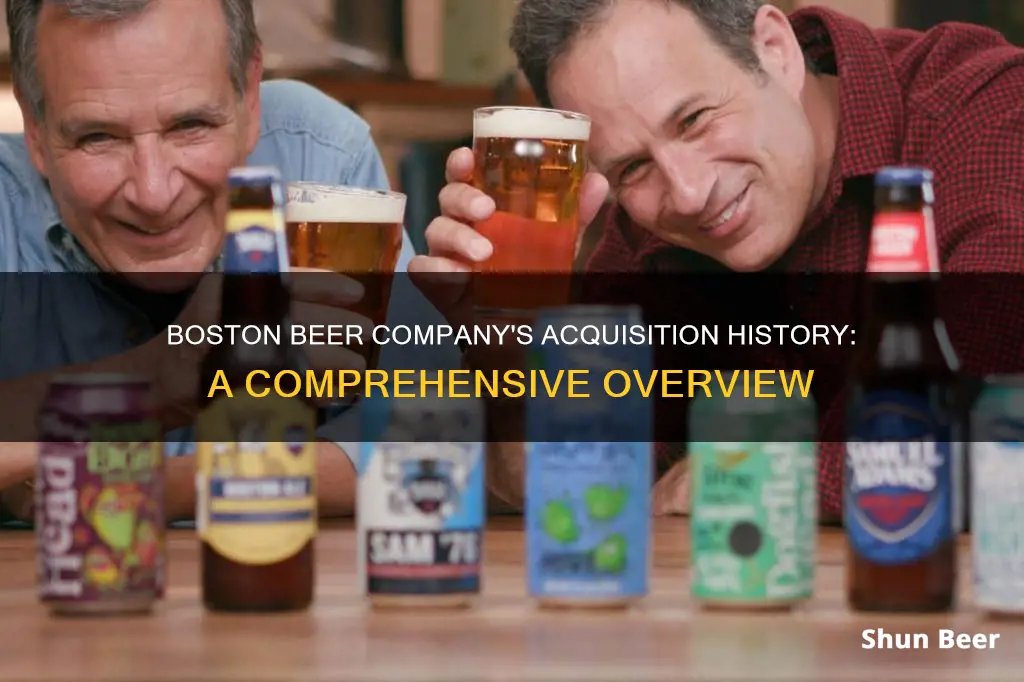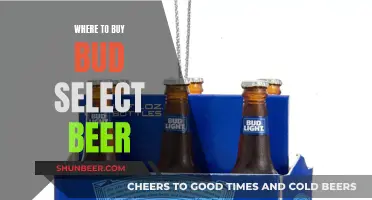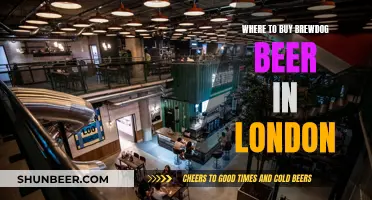
The Boston Beer Company, founded in 1984, has been on an expansion spree since its inception. The company went public in 1995 and has since made several acquisitions to expand its portfolio. In 1997, it purchased the Hudepohl-Schoenling Brewery in Cincinnati, an important step towards reducing its reliance on contract brewing. In 2007, it acquired the former F. & M. Schaefer Brewing Company brewery in Pennsylvania, and in 2012, it launched the Angry Orchard hard cider company. The Boston Beer Company continued its growth trajectory by acquiring the Dogfish Head Brewery for $300 million in 2019, adding to its portfolio of brands and solidifying its position as one of the largest American-owned brewing companies.
What You'll Learn

Boston Beer Company's founding and early years
The Boston Beer Company, one of the largest American-owned brewing companies, was founded in 1984 by James "Jim" Koch, Harry Rubin, Lorenzo Lamadrid, and Rhonda Kallman. Kallman, a colleague of Koch's from the Boston Consulting Group, was made a founding partner and vice president of sales in 1985.
The company's first brand of beer was named Samuel Adams, after Founding Father and American revolutionary patriot Samuel Adams. The initial beer offering was Samuel Adams Boston Lager, a 4.8% ABV amber or Vienna lager, based on a recipe created by Koch's great-great-grandfather, Louis Koch. Koch, the sixth-generation, first-born son to follow in his family's brewing footsteps, brewed his first batch of beer in his kitchen.
At the time, Koch was working at the Boston Consulting Group, and he invested $100,000 of his own money in the company, in addition to raising funds from investors, family members, and friends. The company was organised as a limited liability partnership, and most early investors did not have active roles in the company.
In March 1985, Koch introduced Samuel Adams Boston Lager over Patriot's Day weekend, which honours the first battle of the American Revolution. Six weeks later, the beer was voted "Best Beer in America" at the Great American Beer Festival. By the end of the first year, production was about 500 barrels, and the brand was hand-sold.
Initially, Koch rented excess capacity and brewed the beer at the Pittsburgh Brewing Company, best known for their Iron City brand. As sales increased, Koch developed other contract arrangements at various brewing facilities with excess capacity, such as Stroh breweries and the original Blitz-Weinhard brewery in Portland.
In 1988, the company renovated the former Haffenreffer Brewery in the Jamaica Plain neighbourhood of Boston, which is now a tourist destination. A pilot brewery there also conducts research and development and brews specialty beers for limited release.
Urban Artifact Beer: Where to Buy and Enjoy
You may want to see also

The company's expansion and growth strategy
The Boston Beer Company's expansion and growth strategy has been ambitious from the start. Founded in 1984 by Jim Koch, the company aimed to challenge high-priced imports like Heineken and Beck's by offering a domestically brewed premium beer. By 1992, the brand was distributed nationally across the US, and by 1994 it was the best-selling specialty beer in the country.
The company's growth strategy has been based on creating and offering the highest-quality full-flavor beers, with a focus on educating consumers about the quality of their products and the beer-making process. They have also targeted a specific market segment – beer connoisseurs and aficionados – rather than the general beer-drinking public.
Boston Beer has achieved this through clever advertising strategies, such as quirky radio ads and catchy slogans like "Declare Your Independence from Foreign Beer," as well as through the quality of their product. They have also invested heavily in marketing, with Koch earmarking a large portion of the company budget for this purpose as early as 1986.
In the mid-1990s, Boston Beer expanded its operations by purchasing the Hudepohl-Schoenling Brewery in Cincinnati, and in 2005, they completed a major renovation and expansion of this facility. In 2008, they acquired a third brewery in Breinigsville, Pennsylvania.
The company has also introduced a range of specialty beers, including the popular Samuel Adams Boston Lager, as well as seasonal variations such as Cranberry Lambic and Winter Lager. In addition to the Samuel Adams brand, Boston Beer has diversified its product portfolio by acquiring other companies and launching new brands, such as Hardcore Cider in 1997 and Twisted Tea in 2000.
In recent years, Boston Beer has continued to innovate and expand its operations. In 2012, they launched the Angry Orchard hard cider company, and in 2019, they completed a merger with Dogfish Head Brewery. They have also invested in their facilities, such as quadrupling their canning capacity in Cincinnati in 2020.
The Boston Beer Company's growth strategy has been a success, with the company becoming the fourth-largest brewer in the United States and distributing its products internationally.
Best Places to Buy Boiler Gold Beer
You may want to see also

Boston Beer Company's product portfolio
The Boston Beer Company is an American brewery founded in 1984 by James "Jim" Koch and Rhonda Kallman. The company's first brand of beer was named Samuel Adams after Founding Father and American revolutionary patriot, Samuel Adams.
Since its founding, the Boston Beer Company has launched several other brands, including Hardcore Cider in 1997, Twisted Tea in 2000, Angry Orchard in 2012, and Truly Spiked & Sparkling in 2016. In addition, the company has expanded its portfolio through acquisitions and mergers, including with Dogfish Head Brewery in 2019.
Product Portfolio:
The Boston Beer Company's product portfolio includes a diverse range of beers, ciders, and malt beverages. Here is an overview of their main offerings:
- Samuel Adams: The company's flagship brand, Samuel Adams, offers a wide variety of beers, including the Boston Lager, Rebel IPA, Rebel Rouser, Rebel Rider, Sam Adams Light, and seasonal beers such as the Summer Ale and Winter Lager. Samuel Adams also has the Barrel Room Collection, featuring Belgian-style beers aged in large wood barrels, and Utopias, a strong beer with high alcohol content.
- Hardcore Cider: Launched in 1997, Hardcore Cider offers a range of hard ciders, including year-round and seasonal offerings sold under the Angry Orchard brand since 2012.
- Twisted Tea: Introduced in 2000, Twisted Tea is a 5% ABV malt beverage marketed as a "hard iced tea." The brand has expanded to include a range of flavoured varieties, including a "half and half" variant inspired by an Arnold Palmer.
- Truly Spiked & Sparkling: Launched in 2016, Truly Spiked & Sparkling is a line of hard seltzers offered in various flavours.
- Dogfish Head Brewery: In 2019, Boston Beer Company merged with Dogfish Head Brewery, adding their portfolio of craft beers to their product offerings.
In addition to these core brands, the Boston Beer Company also operates several sub-brands, including The Traveler Brewing Company, Coney Island Brewing Company, Angel City Brewery, and Concrete Beach Brewery. The company constantly innovates and experiments with new styles, flavours, and collaborations to expand its product portfolio and meet the diverse preferences of its customers.
Pueblo Vida Beer: Where to Buy and What to Know
You may want to see also

The company's marketing and advertising approach
The Boston Beer Company's marketing and advertising approach has been a key factor in its success as a leading specialty brewer in the United States. The company has focused on fostering and staying on top of a niche market for beer, the second most popular beverage globally. Unlike other microbrewers who pride themselves on small-batch production and local distribution, Boston Beer has been more ambitious, challenging high-priced imports like Heineken, St. Pauli Girl, and Beck's.
The company's early marketing strategy involved direct, door-to-door marketing, with founder Jim Koch and Rhonda Kallman personally encouraging bartenders to sample their product and explaining why Samuel Adams was a higher-quality brew. This persistence helped them win over the New England market, and by 1987, they were ready to expand to New York City.
As the company grew, they continued to focus on a specific market segment of connoisseurs and beer aficionados rather than targeting the general beer-drinking public. Their advertising campaigns used catchy slogans like "Declare Your Independence from Foreign Beer," and also aimed to educate consumers about the quality and uniqueness of Samuel Adams beer. This included quirky radio advertisements and flag-waving, positioning Samuel Adams as a made-in-the-USA alternative to foreign brews.
Boston Beer also sponsored bar beer nights, distributed promotional items like coasters and t-shirts, and donated their product to charity events to increase public exposure. They recognized the value of investing in marketing, with Koch earmarking a large portion of the company budget for this purpose as early as 1986.
The company's advertising campaigns have not been without controversy. In the 1990s, rival microbrewers threatened litigation over claims made in Koch's advertising, and competitors took issue with ads stating that Samuel Adams was the sole American beer imported into Germany. However, this negative attention also increased brand recognition and drove consumers to try the product.
In addition to its marketing efforts, Boston Beer has also focused on product innovation and quality. They have introduced a range of specialty beers, seasonal variations, and new product lines like ciders and hard iced tea under separate brand names. The company has also worked closely with the homebrewing community, sponsoring contests like the Longshot American Homebrew Contest, which further enhances its reputation for quality and craftsmanship.
In recent years, Boston Beer has continued to adapt its marketing and advertising strategies to reach a broader spectrum of consumers, including younger drinkers and those with more sophisticated tastes. They have also expanded their international presence, introducing their product line to markets like Germany, Ireland, Japan, and Hong Kong.
Alvarium Beer: Where to Buy This Unique Brew
You may want to see also

Boston Beer Company's impact on the microbrewery industry
The Boston Beer Company is one of the largest American-owned brewing companies and has had a significant impact on the microbrewery industry. Founded in 1984 by Jim Koch, the company's first brand of beer was named Samuel Adams, an all-malt Pilsner-style beer based on a recipe created by Koch's great-great-grandfather, Louis Koch.
Boston Beer's success can be attributed to its ability to foster and capitalise on a niche market for beer, the second most popular beverage globally. Unlike other microbrewers who pride themselves on small-batch production and local distribution, Boston Beer has been ambitious and aggressive in its marketing and business strategies. The company directly challenged high-priced imports like Heineken and Beck's, targeting connoisseurs and beer aficionados with an eye for quality.
Boston Beer's pivotal role in sparking the microbrewery boom of the 1990s has become the stuff of business legend. The company's success propelled it beyond the technical definition of a microbrewery, which is limited to an annual production of 15,000 barrels. Despite this, Boston Beer remains the yardstick by which success in the industry is measured.
One of the key ways in which Boston Beer disrupted the industry was by pioneering a new business model based on 'value-chain cooperation and shoaling' rather than consolidation or domination. This model has proven more effective in generating profits and sustaining growth than the traditional route of mergers. Instead of locking all capital in production assets, Boston Beer grew through microbrewery production methods and contracts with third-party packers and franchisees.
Boston Beer also operates in a decentralised and dispersed manner, using a chain of contract brewers to market its specialty crafted beers nationally without incurring shipping expenses. This strategy has enabled the company to achieve variety, quality, uniqueness, and customisation, inspiring other small and microbrewers.
In addition to its innovative business model, Boston Beer has also been at the forefront of product innovation. The company has launched over 500 varieties, releasing 25 new beers in 2012 alone. Boston Beer has also been willing to share its success, helping over 4,000 entrepreneurs and making nearly 400 loans totalling $400 million through its Brewing the American Dream program.
In summary, the Boston Beer Company's impact on the microbrewery industry has been significant. Through its disruptive business model, innovative products, and willingness to share its success, the company has transformed the industry and inspired a generation of microbrewers.
Underage Beer Buying: Sneaky Strategies for Minors
You may want to see also
Frequently asked questions
The Boston Beer Company was founded in 1984 by James "Jim" Koch and Rhonda Kallman.
The Boston Beer Company went public in 1995.
The Boston Beer Company's first brand of beer, Samuel Adams Boston Lager, was voted Best Beer in America at the Great American Beer Festival in 1985.
The Boston Beer Company began to expand in 1990 when it reached an agreement with Portland, Oregon-based Blitz-Weinhart Brewing to brew and distribute its product in the western United States.







